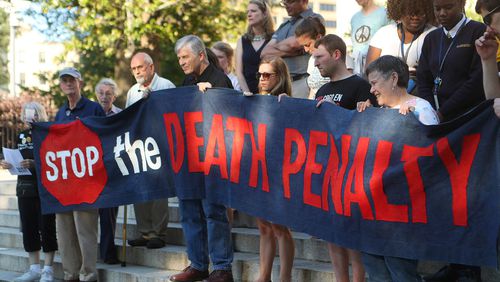In its first execution this year, Georgia has put to death J.W. “Boy” Ledford Jr. for the 1992 murder of his 73-year-old neighbor Dr. Harry Johnston, the physician who delivered Ledford when he was born.
The lethal injection was carried out at 1:17 a.m. Wednesday at the Georgia Diagnostic and Classification Prison in Jackson.
The U.S. Supreme Court denied a stay of execution after midnight for Ledford, 45, clearing the way for the lethal injection.
Death penalty opponents around the state had been praying for hours in advance of Ledford's execution, which was scheduled to take place Tuesday at 7 p.m.
While Georgia executions are usually set for 7 p.m., the state does not proceed until all courts have weighed in, which usually puts the actual time of death well into the night and sometimes into the early morning hours of the next day.
» INTERACTIVE: The faces on Georgia’s Death Row
» GALLERY: Who has been executed in Georgia since 1976 and their victims
Tuesday evening, the 11th U.S. Circuit Court of Appeals denied Ledford’s petition for a stay of execution, just as the Georgia Supreme Court did Tuesday afternoon.
On Monday the State Board of Pardons and Paroles denied Ledford’s clemency petition despite pleas from his mother, his six sisters and his son.
Also on Monday, the 11th U.S. Circuit Court of Appeals rejected Ledford's lethal injection challenge, in which he requested death by firing squad on the grounds that a lethal injection would subject him to too much pain.
Ledford argued in legal motions that he was at risk of an excruciating death because the lethal injection drug would react badly to medication he has taken for a decade for chronic pain. He said death by firing squad would be more humane.
Georgia law specifically requires executions by lethal injection.
Ledford also argued that he was exempt from the death penalty because he is intellectually disabled, a contention rejected by previous courts.
In their motion to the Georgia Supreme Court, Ledford’s attorneys argued that his death sentence was “excessive and disproportionate punishment.”
Ledford was “barely 20 years old at the time that he committed an ill-conceived robbery” of Johnston, the motion said. It contended that neither the federal nor state Constitutions should permit the execution of an offender who was that young at the time of the crime, the motion said.
Meanwhile, in the federal appeals court’s rejection Monday of Ledford’s push for death by firing squad, Judge Frank Hull wrote for a unanimous three-judge panel:
“The Georgia Legislature is free, within the parameters established by the United States Constitution, to choose the method of execution it deems appropriate. Execution by lethal injection has been ruled constitutional.”
Having authorized a constitutional method of execution, Georgia is under no constitutional obligation to experiment with execution by firing squad, Hull wrote.
» WATCH AND READ: How lethal injection works
As he waited on word of his fate Tuesday afternoon, Ledford had his dinner and was visited by one friend.
According to court records concerning the 1992 murder, Ledford stabbed Dr. Johnston several times, with one wound to his neck almost decapitating the physician. Ledford confessed to the murder but said it was self-defense, claiming Johnston struck him and threatened him with a knife.
Georgia executed nine men last year, more than any other state.








